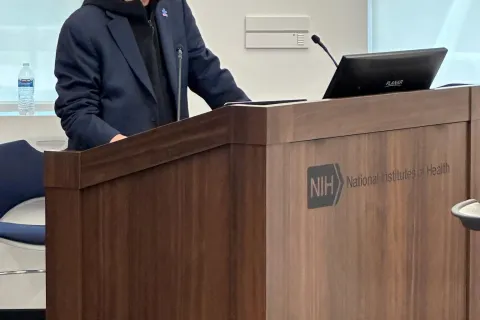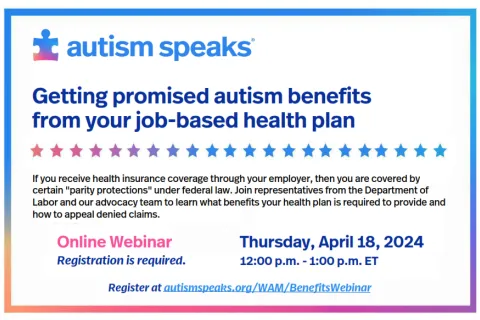New priorities added to Autism CARES Act of 2024 as it advances in Congress
Key US House Subcommittee amended the Autism CARES Act of 2024 to include expansion of programs and increased focus on inclusion of autistic individuals across the spectrum and lifespan
May 16, 2024Today, the U.S. House Energy and Commerce Committee’s Subcommittee on Health reviewed 23 bills, including the Autism Collaboration, Accountability, Research, Education, and Support (CARES) Act of 2024 (H.R. 7213). We are grateful to Chair Guthrie, Ranking Member Eshoo, Chair McMorris Rodgers, and Ranking Member Pallone for convening this meeting and recognizing the urgent need to invest in autism research and training programs to ensure better care and well-being for autistic people. As a result of today’s markup, the Autism CARES Act of 2024 has been amended to include changes, many of which were suggested by Autism Speaks and colleague organizations, that not only sustain support for existing federal autism programs but also expand efforts and address challenges for currently underserved portions of the autism population.
As the most comprehensive federal law addressing the urgent needs of the autism community, the Autism CARES Act of 2024 includes over $2 billion in authorized federal spending on autism research and training programs for the next five years. Autism Speaks has led efforts, and worked in coalition with other organizations, to ensure that the federal programs that exist due to this law continue to expand and evolve to meet the diverse needs of the entire autism community. After countless meetings with our congressional champions, collaboration with other stakeholders and organizations, and meetings held by 100+ advocates during our Advocacy Forum & Hill Day, we are proud to celebrate this milestone in not only advancing the Autism CARES Act of 2024 but expanding its impact through new elements of the bill.
The Autism CARES Act has been the single most important driver of federal investment in autism research and training programs over the past two decades.
Through the research, training and data collection programs at the National Institutes of Health (NIH), Health Resource and Services Administration (HRSA) and Centers for Disease Control and Prevention (CDC), the Autism CARES Act has resulted in:
- A lower average diagnosis age and improvements in early intervention services;
- Updated data on the prevalence of autism in children and adults across the spectrum and within different demographic and geographic communities;
- The training of tens of thousands of health professionals through Leadership Education in Neurodevelopmental and Other Related Disabilities (LEND) sites and Developmental Behavioral Pediatric Training Programs.
- Advancements in understanding autism, including the co-occurring physical and mental health conditions that affect autistic individuals at much higher rates;
- Actionable data on the significant disparities that autistic people experience in terms of access to quality health care, daily life supports and services, and employment opportunities; and
- and development of personalized approaches and evidence-based best practices for serving autistic individuals.
Under the leadership of Autism Caucus Co-Chairs Congressmen Chris Smith and Henry Cuellar, the Autism CARES Act of 2024 was introduced earlier this year to renew the bill before portions of it expire at the end of September. Thanks to their collaboration and commitment to not just sustaining support for federal autism programs but building on progress, the bill now includes several new important elements, many of which were suggested by Autism Speaks and colleague organizations.
In addition to continuing existing federal autism programs, the Autism CARES Act of 2024 now also includes the following enhancements:
- New language directs the NIH Director to ensure a more inclusive approach to autism research. This change will help to propel greater inclusion of individuals that have been underrepresented in autism research studies, in particular autistic people who require 24-hour care and may struggle with harmful or self-injurious behaviors.
- The creation of a new Autism Intervention Research Network for Communication Needs will benefit autistic individuals who may be unable or limited in using speech or language to communicate. This would be the third Autism Intervention Research Network established under the Autism CARES Act. The two existing networks focus on physical health and behavioral health and help translate research into clinical practice and community-based resources that serve people with autism and their families.
- The inclusion of gerontology (the study of the aging process) as a focus area of autism research activities will help propel future research on autism and aging. There are more than 5.4 million autistic adults in the U.S., about 2.2% of the population, yet people on the spectrum are rarely included in aging research and consequently have not benefited from advances in understanding and care of aging populations. Despite autism being a lifelong condition, there is a near-absence of research on ASD in older age and very little is known around how to best serve aging autistic adults. Advancements in this area will help ensure the aging autistic community benefits from research that drives improved quality of life across the lifespan.
- The Government Accountability Office will be required to issue a study and report on how to increase the number of developmental behavioral pediatricians (DBP). By expanding the DBP workforce, children with a wide range of developmental and behavioral concerns, including autism, would have increased access to evaluation and services that address medical and psychosocial aspects of development. It also sets a higher standard for what quality medical care for children with autism looks like.
- Approximately $279 million increase in spending on federal autism programs will result from an increase of annual funding authorization levels by $56 million more than the previous iteration of the Autism CARES Act. This results in a total investment of over $2.1 billion over the next 5 years.
The Autism CARES Act of 2024 builds on progress from previous iterations of the law and will help propel forward critical research and training programs that benefit people with autism and their families. We look forward to working with congressional champions to continue to fortify the impact of this legislation and pass it in a timely manner.
Join us in asking Congress for its swift passage!








